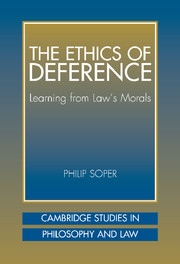3 - Claiming Authority
Published online by Cambridge University Press: 18 December 2009
Summary
Introduction
In Chapter 1, I suggested that current legal theory, confronted with law's apparent moral claims, tends toward two mistakes. The first mistake is to demote law's claims, making them accidental rather than necessary features of legal systems. Under this view, legal systems are essentially coercive. The fact that many such systems make normative claims for their directives is no more critical to the understanding of the concept than the fact that legal systems make different kinds of normative claims, reflecting the different ways in which state power can be organized. No one would suggest, for example, that the concept of “legal system” properly applies only to those systems that make a particular type of normative claim about their right to coerce – democratic claims, say, rather than totalitarian ones. In like fashion, it is suggested, we should not limit the concept to just those systems that make normative claims in general of whatever type: What counts in deciding that systems are legal is the organized coercion that distinguishes legal systems from, say, religious and moral systems.
The second mistake in current characterizations of law's claims errs in the opposite direction by promoting those claims to what I previously described as strong moral claims. It is easy to see how this promotion might occur. Modern positivists recognize that the normative claims about law's moral force are presented as serious (at least by insiders); but since it must be obvious, even to insiders, that officials can make mistakes and that particular norms can thus (however unwittingly) be unjust, the claims about law's moral force must be about the duty to obey law just because it is the law: Law must, in short, claim practical authority.
- Type
- Chapter
- Information
- The Ethics of DeferenceLearning from Law's Morals, pp. 51 - 88Publisher: Cambridge University PressPrint publication year: 2002
- 1
- Cited by

